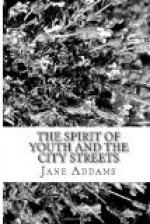It is as if a child, starved at home, should be forced to go out and search for food, selecting, quite naturally, not that which is nourishing but that which is exciting and appealing to his outward sense, often in his ignorance and foolishness blundering into substances which are filthy and poisonous.
Out of my twenty years’ experience at Hull-House I can recall all sorts of pilferings, petty larcenies, and even burglaries, due to that never ceasing effort on the part of boys to procure theater tickets. I can also recall indirect efforts towards the same end which are most pitiful. I remember the remorse of a young girl of fifteen who was brought into the Juvenile Court after a night spent weeping in the cellar of her home because she had stolen a mass of artificial flowers with which to trim a hat. She stated that she had taken the flowers because she was afraid of losing the attention of a young man whom she had heard say that “a girl has to be dressy if she expects to be seen.” This young man was the only one who had ever taken her to the theater and if he failed her, she was sure that she would never go again, and she sobbed out incoherently that she “couldn’t live at all without it.” Apparently the blankness and grayness of life itself had been broken for her only by the portrayal of a different world.
One boy whom I had known from babyhood began to take money from his mother from the time he was seven years old, and after he was ten she regularly gave him money for the play Saturday evening. However, the Saturday performance, “starting him off like,” he always went twice again on Sunday, procuring the money in all sorts of illicit ways. Practically all of his earnings after he was fourteen were spent in this way to satisfy the insatiable desire to know of the great adventures of the wide world which the more fortunate boy takes out in reading Homer and Stevenson.
In talking with his mother, I was reminded of my experience one Sunday afternoon in Russia when the employees of a large factory were seated in an open-air theater, watching with breathless interest the presentation of folk stories. I was told that troupes of actors went from one manufacturing establishment to another presenting the simple elements of history and literature to the illiterate employees. This tendency to slake the thirst for adventure by viewing the drama is, of course, but a blind and primitive effort in the direction of culture, for “he who makes himself its vessel and bearer thereby acquires a freedom from the blindness and soul poverty of daily existence.”
It is partly in response to this need that more sophisticated young people often go to the theater, hoping to find a clue to life’s perplexities. Many times the bewildered hero reminds one of Emerson’s description of Margaret Fuller, “I don’t know where I am going, follow me”; nevertheless, the stage is dealing with the moral themes in which the public is most interested.




